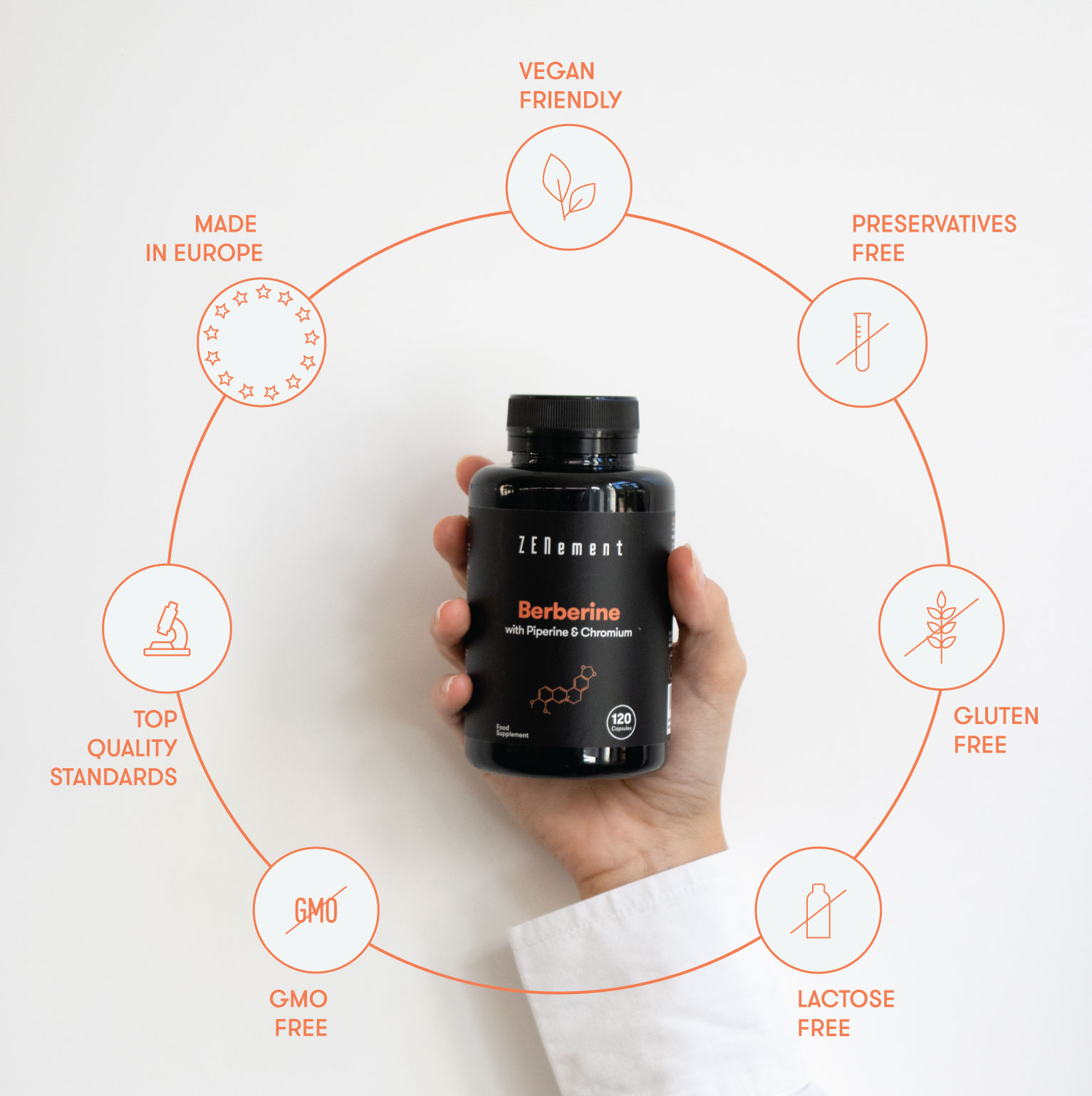In this post we are going to talk about what berberine is and how this molecule promotes longevity. Its mechanism of action is genetic: it activates one of the longevity genes, namely AMPK (AMP-activated kinase). Activating this pathway has two effects: it promotes the synthesis of mitochondria and increases sensitivity to insulin in our tissues, two important anti-ageing processes.
What is berberine and what are its benefits?
Berberine is a yellow alkaloid found mainly in Berberis plants, such as Berberis aristata (Indian barberry or tree turmeric).
This molecule acts in our body by directly activating the AMPK pathway. As we have already mentioned, this mechanism has two effects:
1. It increases mitochondrial biogenesis:
Among the many hallmarks of ageing, we find the malfunctioning and decreased biogenesis (synthesis) of mitochondria. These organelles are particularly susceptible to damage over time as they are the main bioenergetic machinery. A decrease in mitochondrial biogenesis results in the accumulation of oxidised forms of lipids, proteins and DNA (known as free radicals).
Effective control of mitochondrial biogenesis and turnover, for example through the use of berberine, is essential for the maintenance of energy production, the prevention of endogenous oxidative stress and the promotion of healthy ageing.
2. It increases our body’s insulin sensitivity:
Insulin is a hormone produced by the pancreas that helps blood glucose enter muscle, fat and liver cells where it is used for energy.
When cells do not respond well to insulin and cannot absorb glucose from the blood easily, we say that the tissues are insulin resistant. It can be caused by being overweight, chronic stress, low physical activity or it can also be due to the effects of aging. If this happens, the glucose level in our blood rises (hyperglycaemia). This situation is very harmful to our bodies as it can damage the blood vessels that carry blood to vital organs, increasing the likelihood of heart disease, stroke, kidney disease, eye problems and neurological problems.
Berberine improves insulin resistance by activating the AMPK pathway, promoting mitochondrial function and stimulating glycolysis (destruction of glucose for energy). This allows normal blood glucose levels to be maintained.
In addition, human studies show that berberine can improve obesity and hyperlipidaemia by reducing triglycerides (TAG) and LDL (bad) cholesterol and increasing HDL (good) cholesterol to support cardiovascular health.
Berberine doses studied range from 1000 to 2000 mg/day.
|
Did you know…? Berberine is a natural analogue of metformin. Metformin is a drug used to treat type II diabetes and berberine is a molecule that mimics its effects. At no time should berberine replace medication, so if you are undergoing medical treatment, seek advice from your specialist before taking any food supplement. |
Zenement’s Berberine
Each capsule of our Berberine contains 500 mg of berberine sourced from Berberis aristata plant root. In our formula, we combine it with chromium, which contributes to the maintenance of normal blood glucose levels, and piperine to improve absorption of the active ingredients in the capsule.
How to use: 1-2 capsules with a main meals (e.g. breakfast and dinner).
|
Warnings and Interactions: Berberine should not be taken if you are undergoing treatment with: – Metformin – Immunosuppressants Berberine also has moderate interactions with: – Antitussives such as Dextromethorphan because it slows down the rate at which they are broken down in your body. – Antihypertensive drugs as they may cause your blood pressure to drop excessively. – Anticoagulant or anti-platelet medicines because it may slow down clotting. – Sedative medicines (CNS depressants) as it may cause drowsiness. |
In addition to this post, we recommend you read our 9 tips to delay ageing and live longer and better. You may also be interested in our article on Resveratrol and Quercetin, anti-ageing food supplements.



